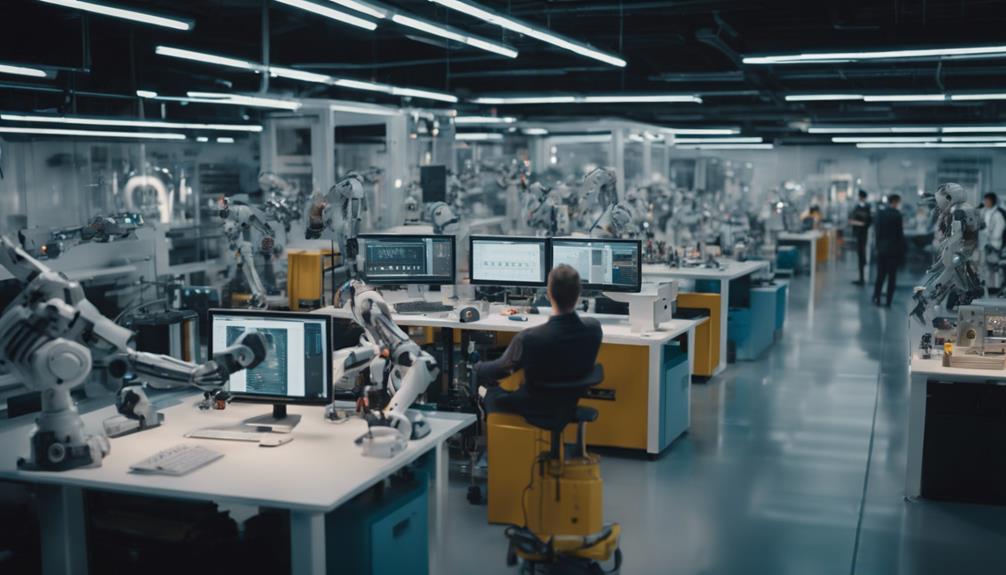AI automation slashes small business costs by streamlining repetitive tasks and reducing human errors. For instance, automating data entry can slash costs by up to 80% and cut processing time by 90%. AI also enhances customer interactions, with chatbots handling 80% of routine queries and cutting service expenses by 30%. Operational efficiency improves remarkably, reducing costs by up to 25% and saving 40 hours weekly. Real-time data insights from AI drive smarter decisions, optimizing resources and further cutting expenses. Continue, and you'll uncover more on how AI reshapes cost structures and boosts competitive edge.
Key Takeaways
- AI automation reduces labor costs by streamlining tasks like data entry and scheduling.
- Error reduction minimizes rectification costs and enhances operational accuracy.
- Automating workflows boosts operational efficiency, cutting operational costs by up to 25%.
- Predictive analytics with AI eliminates unnecessary expenses and reduces errors.
- AI-powered chatbots handle routine queries, cutting customer service costs by 30%.
Streamlining Repetitive Tasks
AI automation greatly streamlines repetitive tasks like data entry and scheduling, leading to time savings and reduced labor costs for small businesses. By integrating AI automation, I can drastically cut operational costs, as these technologies handle routine tasks with unparalleled efficiency.
This not only boosts productivity but also frees up valuable resources, allowing me to reallocate them to more strategic activities. Time savings translate directly to cost reduction, as fewer hours are spent on monotonous tasks. Additionally, the diminished reliance on manual labor reduces overall labor costs, making my business leaner and more competitive.
Ultimately, AI automation fosters improved resource allocation and productivity, driving significant cost reductions for small businesses like mine.
Reducing Human Error
I've seen firsthand how AI automation can streamline data entry, enhancing process accuracy and minimizing manual oversight.
Studies indicate that error rates can drop from 5% to as low as 1%, translating to significant cost savings.
Streamlining Data Entry
By integrating AI into data entry tasks, businesses can dramatically reduce human error rates, decreasing them from 5% to just 1%. This significant drop in errors means small businesses can streamline operations, effectively reducing costly mistakes.
AI automation not only improves efficiency but also lowers rectification costs from $1000/month to just $100/month. By reducing errors, businesses enhance service quality, save time, and conserve valuable resources.
As a result, AI-enabled data entry processes offer a dual benefit: cutting small business costs and boosting overall operational performance. Adopting AI for data entry is therefore a strategic move, allowing small enterprises to innovate and thrive in a competitive market.
Enhancing Process Accuracy
Building on the efficiency gains from AI-driven data entry, harnessing AI to enhance process accuracy can drastically reduce human error rates and associated costs. AI automation minimizes mistakes by decreasing error rates from 5% to just 1%, which translates to significant cost savings.
For instance, businesses can cut rectification costs from $1000/month to $100/month. By automating repetitive tasks, AI not only streamlines operations but also improves service quality. This boosts efficiency by eliminating manual errors and optimizing workflow accuracy.
Small businesses can consequently reduce operational costs, leading to enhanced decision-making and smoother operations. The cumulative effect is a reduction in small business costs, driven by improved process accuracy and streamlined operations.
Minimizing Manual Oversight
Leveraging AI automation to minimize manual oversight slashes human error rates from 5% to 1%, offering significant cost-reduction opportunities for small businesses. By integrating AI into business processes, we can dramatically lower rectification costs from $1000/month to $100/month. This technology streamlines operations by eliminating manual tasks, which improves accuracy and reduces costly mistakes.
The precision of AI algorithms in handling repetitive tasks not only enhances service quality but also decreases labor costs. Small businesses that adopt AI automation see improved efficiency, productivity, and decision-making processes. Ultimately, this leads to substantial cuts in operational costs, proving that minimizing manual oversight through AI is a game-changer for small business success.
Increasing Operational Efficiency

Regularly harnessing AI automation significantly boosts small business operational efficiency by optimizing workflows and cutting costs. Implementing AI automation has helped small businesses reduce operational costs by up to 25% and enhanced operational efficiency by 20%. By automating repetitive tasks, small businesses save up to 40 hours weekly. AI-driven predictive analytics is essential for streamlining processes, cutting down unnecessary expenses by 30%, and reducing operational errors by 15%. The following table highlights these key benefits:
| Benefit | Percentage Improvement |
|---|---|
| Reduced Operational Costs | 25% |
| Increased Operational Efficiency | 20% |
| Saved Weekly Work Hours | 40 hours |
These data-driven insights underscore the transformative potential of AI automation in refining business operations, making it a cornerstone for innovation-driven enterprises.
Automating Data Entry
AI automation dramatically slashes data entry costs by up to 80%, freeing up valuable time and resources for small businesses. By automating data entry, I've noticed a significant reduction in errors, leading to more accurate data management.
AI tools streamline these tasks, boosting efficiency and productivity. This enables small businesses to reallocate resources towards strategic growth.
Here's how AI automation impacts data entry:
- Error reduction: Minimizes human errors, ensuring data accuracy.
- Time savings: Cuts down processing time by up to 90%.
- Resource allocation: Frees up staff for higher-value tasks.
- Cost efficiency: Reduces the financial burden of manual data entry.
- Operational productivity: Enhances overall business efficiency.
Embracing AI to automate data entry transforms our operations, making them leaner and more strategic.
Enhancing Customer Interactions

When I look at how AI is transforming customer interactions, the data is compelling.
AI-powered chatbots streamline support processes by handling 80% of routine queries. This not only cuts service costs by up to 30% but also greatly enhances customer satisfaction.
Additionally, AI's ability to analyze interactions allows for personalized engagement strategies. This boosts customer retention and creates more tailored experiences.
Streamlining Support Processes
Leveraging AI automation in customer support, businesses can handle up to 80% of routine queries, greatly reducing the reliance on human agents. This shift not only streamlines processes but also cuts small business costs considerably. AI chatbots, operating 24/7, guarantee rapid response times and enhanced service quality.
- Instant responses: Customers get answers immediately.
- Reduced labor costs: Fewer human agents needed.
- 24/7 availability: No downtime, ever.
- Scalable interactions: Handle multiple queries simultaneously.
- Data-driven improvements: Analyze interactions to enhance service.
Personalizing Engagement Strategies
Building upon the efficiency gains in support processes, businesses can further enhance customer interactions by personalizing engagement strategies through AI automation. By analyzing data, AI tailors engagement strategies to meet individual customer needs, resulting in higher satisfaction.
Chatbots powered by AI offer 24/7 support, greatly reducing operational costs while enhancing response time and the quality of interactions. This not only boosts customer engagement but also fosters loyalty. By handling routine queries, AI chatbots free up human resources for more strategic tasks, making operations more efficient.
For small businesses, AI-driven tools can cut customer service costs by up to 30%, providing a substantial reduction in overall expenses. AI automation is a game-changer in personalizing customer interactions and driving business success.
Optimizing Inventory Management
AI automation revolutionizes inventory management by accurately predicting demand, reducing excess stock, and minimizing stockouts. For small businesses, this means substantial cost savings and enhanced supply chain efficiency. AI-powered systems analyze historical sales data and market trends, optimizing stock levels and cutting inventory-related costs by up to 30%.
The benefits are remarkable:
- Accurate demand forecasting: Reduces overstock and stockouts.
- Real-time inventory tracking: Enhances decision-making.
- Reduced storage expenses: Lowers carrying costs.
- Elimination of manual errors: Increases accuracy.
- Faster order processing: Improves customer satisfaction.
Analyzing Data for Insights

While optimizing inventory management greatly reduces costs, analyzing data for insights further empowers small businesses to make strategic, informed decisions. AI automation excels at data analysis, uncovering patterns, trends, and valuable insights into customer behavior and market trends.
By processing large datasets efficiently, AI automation helps small businesses pinpoint cost-saving opportunities and optimize operational efficiency. It swiftly sifts through vast amounts of data, dramatically reducing time and resources needed to extract actionable insights.
Leveraging AI automation for data analysis enables small businesses to make data-driven decisions, enhancing performance and identifying areas for improvement. Ultimately, the ability to analyze data thoroughly with AI automation translates to significant cost savings and a stronger competitive edge in the market.
Scaling Without Labor Costs
By automating repetitive tasks, small businesses can scale operations efficiently without the burden of additional labor costs. AI automation allows us to streamline workflows and reduce dependency on human resources, leading to significant cost savings. It enhances productivity and efficiency, enabling businesses to grow without proportional labor expenses.
Consider these benefits:
- Cost savings: Reduced wages and training expenses.
- Increased productivity: Automated processes work faster and more accurately.
- Improving efficiency: Streamlined workflows eliminate bottlenecks.
- Scalability: Easily expand operations without hiring more staff.
- Reduced dependency on human resources: Less reliance on manual labor.
Frequently Asked Questions
How Does AI Reduce Costs in Business?
AI reduces costs in business by leveraging machine learning, predictive analytics, and chatbots efficiency. It optimizes workflows, automates tasks, enhances resource allocation, minimizes errors, and streamlines operations through data processing and virtual assistants.
How Does AI Affect Small Businesses?
AI transforms small businesses by optimizing workflow, enhancing customer insights, improving inventory management, and bolstering fraud detection. Personalized marketing, talent acquisition, supply chain, financial forecasting, market analysis, and predictive maintenance all benefit, driving innovation and efficiency.
How Can AI Add Value to a Small Business?
AI adds value to my small business by providing customer insights, predictive analytics, and inventory management. It enhances marketing automation, process optimization, talent acquisition, sales forecasting, workflow automation, personalized experiences, and fraud detection, driving innovation and growth.
What Is the Advantage of AI Automation?
AI automation acts like a well-oiled machine, boosting employee productivity, enhancing customer support, and improving process efficiency. It excels in error reduction, data analysis, marketing optimization, and predictive maintenance, ensuring real-time monitoring and seamless task automation.
Conclusion
Simply put, AI automation is a game-changer for small businesses. By handling repetitive tasks, minimizing errors, and boosting efficiency, it allows businesses to focus on growth rather than mundane operations.
Imagine a world where data entry is seamless, customer interactions are enhanced, and inventory is perfectly managed—all without the increasing labor costs.
The data doesn't lie: AI isn't just a tool; it's the cornerstone of modern operational success.





